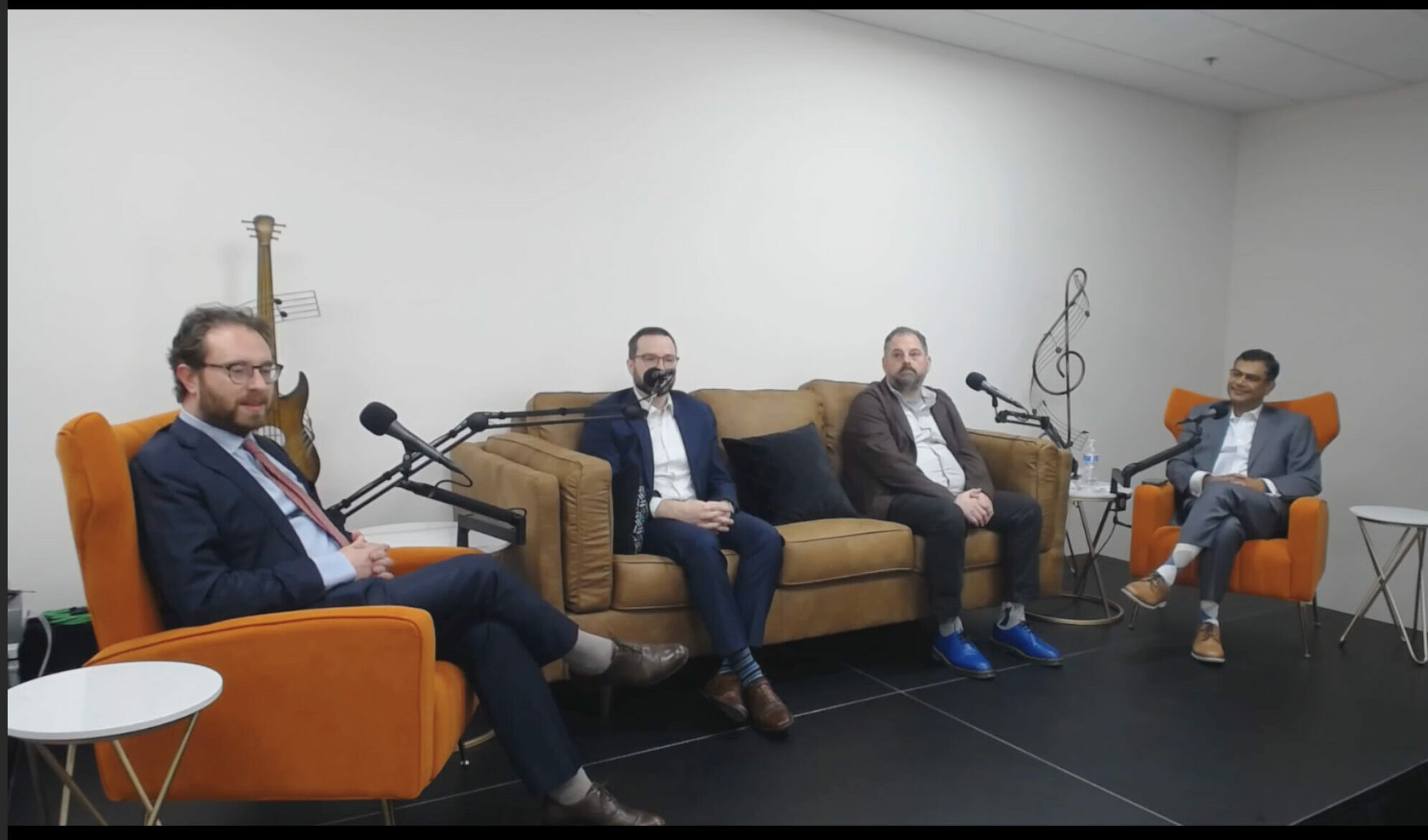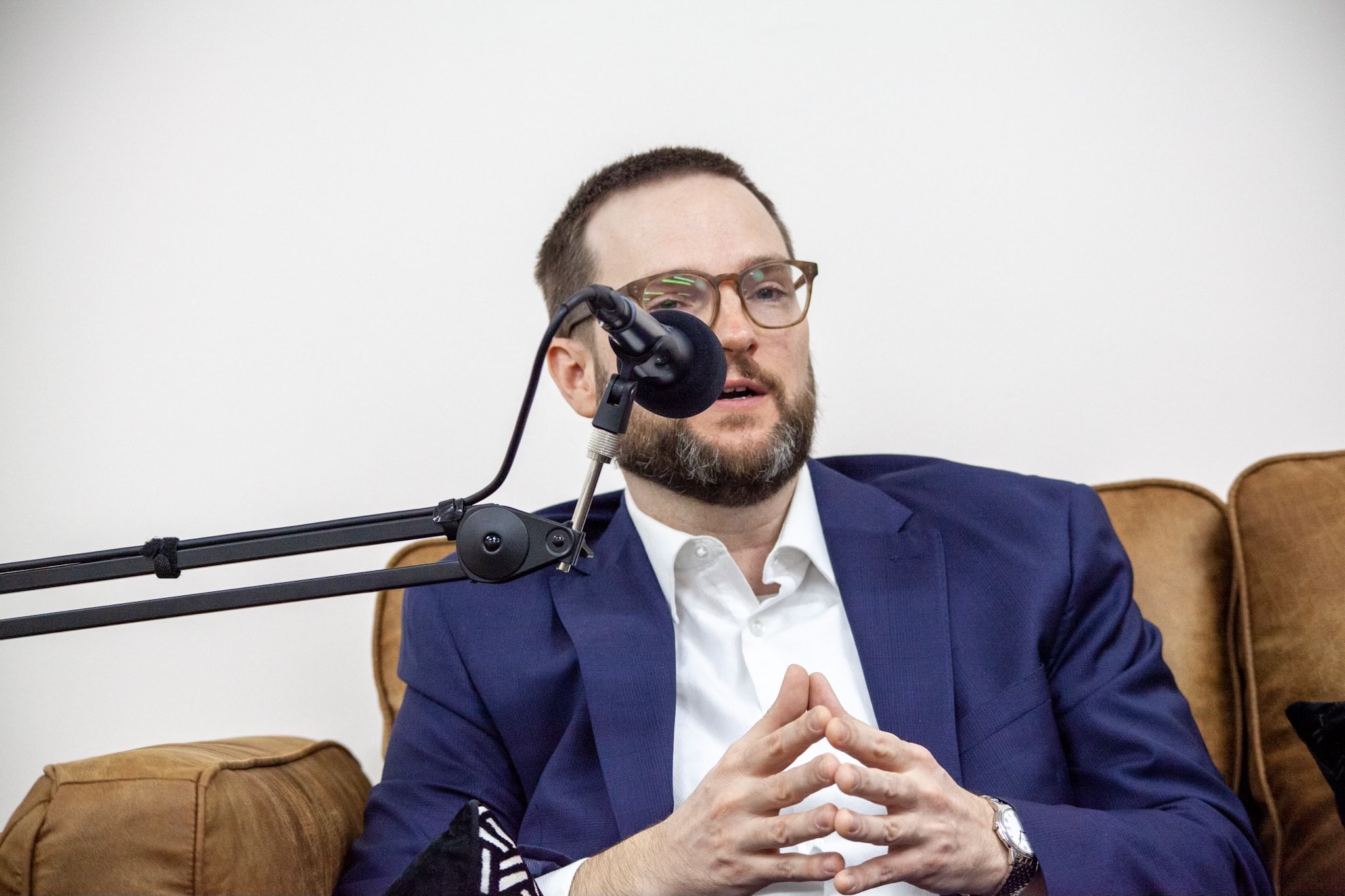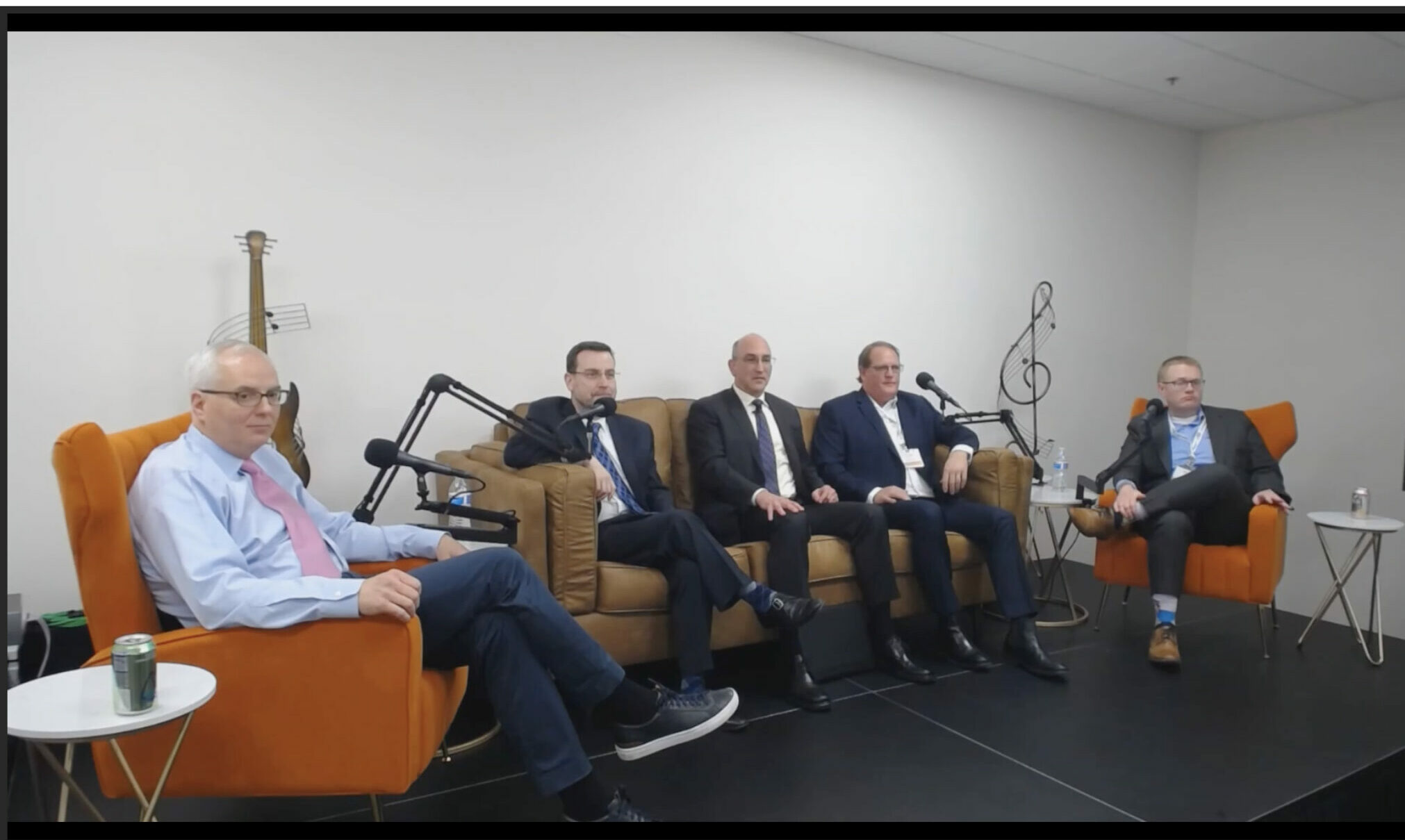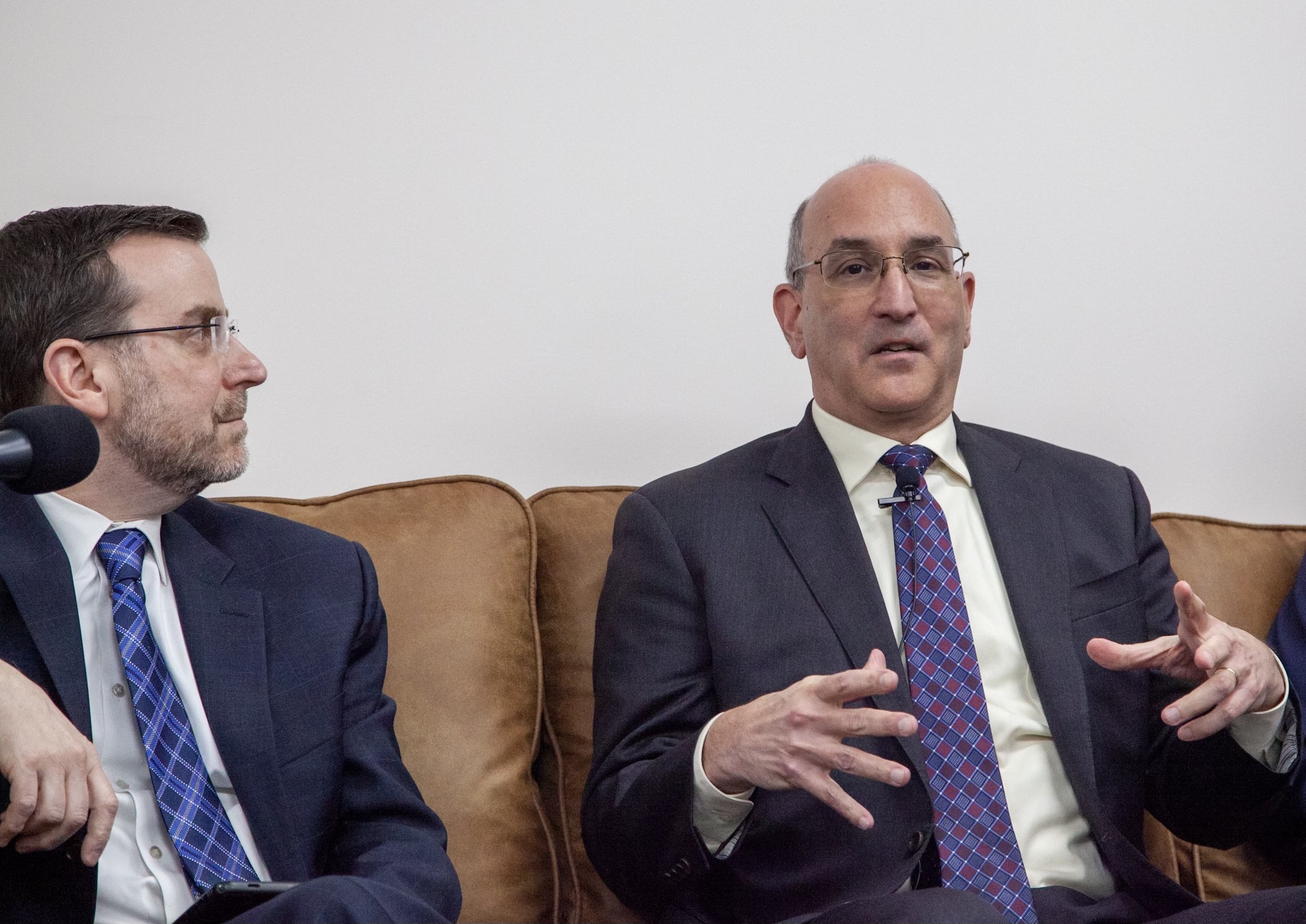“If you have software in your claimed invention, you’re in trouble…The two cutting-edge areas of innovation – biotech and software – are now the two areas where patent protection has been withdrawn, and that’s a problem.” -Adam Mossoff

From left: Ryan Abbott, Chris Hannon, Jason Alan Snyder and Dr. DJ Nag
Panelists at IPWatchdog’s Artificial Intelligence Masters Program today debated how artificial intelligence (AI) interacts with intellectual property protection, and how laws around who (or what) can be an inventor or creator, as well as areas like patent eligibility, will need to evolve to ensure the continued “gold standard” status of the U.S. IP system.
Attorneys working on some of the biggest cases in the AI space today took part in day one of AI Masters, including Professor Ryan Abbott, who is representing Stephen Thaler in his myriad of cases involving the AI machine, DABUS, both in the United States and elsewhere, and Van Lindberg, who represented Kristina Kashtanova in their recent bid to copyright a partially AI-generated graphic novel.
Abbott told attendees that the law will eventually evolve, like it always does, to accommodate AI inventors and authors. Using the example of ChatGPT, Abbott said we are already at the point where AI is creating and inventing independently. “The bar for making an original work is exceptionally low,” Abbott explained. He added:
“If I tell one of my students, ‘go write three sentences for me on this conference,’ that work is protected by copyright and that is exactly what ChatGPT does, and it does it in no way that someone is directly contributing as an author to that work other than the machine. So, if you’re not going to allow that then you get rid of IP protection for an entire universe of invention [or creations].”

Chris Hannon
But Christian Hannon, a Patent Attorney in the U.S. Patent and Trademark Office’s (USPTO’s) Office of Policy & International Affairs said the output still comes down to human intervention. You can design a machine to select from a large corpus of information, Hannon said, “but I still argue it’s the human being on the back end who’s programming all of that. I think it’s similar in copyright and patents – you’re starting out from these large data sets and setting the computer down a course to generate these outputs.”
Another panelist, Jason Alan Snyder, Global Chief Technology Officer with Momentum Worldwide, said it will be at least 15 years before AI develops to the point that it may be considered “sentient,” and in the meantime, we will have to adapt quickly. “Our technology has clearly surpassed our legislation and our morality, and it’s really important to understand what it isn’t while we try to figure out what it is,” Snyder said.
AI and Eligibility

From Left: Joe Matal, Adam Mossoff, Drew Hirshfeld, Neil Greer and Nick Matich
An additional barrier to software-related inventions in the United States today is patent eligibility law, which has become muddled in the view of many practitioners. A panel titled “Patent Eligibility: Has the Supreme Court Struck the Right Balance?” featured former U.S. Patent and Trademark Office (USPTO) interim heads, Drew Hirshfeld and Joe Matal, as well as Professor Adam Mossoff of George Mason University’s Antonin Scalia School of Law, Nick Matich of McKool Smith and Neil Greer of Impact Engine, Inc.
The panel was inspired by a LinkedIn conversation initiated when Matal recently commented on a 2019 opinion piece in The Hill authored by former USPTO Deputy Director, Russ Slifer. In that op-ed, Slifer dubbed the U.S. patent system “judicially mangled” thanks to the Supreme Court’s expansion of judicial exceptions, and Matal remarked that Slifer’s admission that eligibility jurisprudence originated from the 1850s, under the likes of Justices Jackson, Van Buren and Polk, contradicts the commonly-held view that current Section 101 law is the result of anti-capitalist activists. Mossoff, Matich, IPWatchdog Founder and CEO Gene Quinn and Slifer all participated in that LinkedIn dialogue, and Matal suggested they move the conversation to real life (Hirshfeld stood in for Slifer, who could not make the program).

Left: Mossoff and Right: Hirshfeld
As a former USPTO examiner, Commissioner for Patents, and interim USPTO Director, Hirshfeld said he wanted to make it clear that “I think that the U.S. patent system overall is gold-standard and I don’t want to let anybody think otherwise.” However, he said that “eligibility is not in a good place and needs to be fixed” and that legislation is the only way forward.
As the sole technologist on the panel, Greer said Federal Circuit cases on eligibility law need to be distilled now, so that software developers can implement them. Quinn asked if a Restatement of patent law was needed – a concept Matal generally agreed with – but Mossoff said it’s not that simple. “I don’t think it’s made up that the belief among lawyers is that [Federal Circuit outcomes are] entirely panel-dependent,” Mossoff said. He disagreed “that you could take these hundreds of cases and do a nice Restatement,” explaining that you would find many contradictory decisions among them.
“If you have software in your claimed invention, you’re in trouble,” Mossoff added, further noting that “the two cutting-edge areas of innovation – biotech and software – are now the two areas where patent protection has been withdrawn, and that’s a problem.”
Other panels on day one examined “AI Data Permission” and how to tell whether you have rights to the underlying data involved in AI use; “Copyrights and AI: The Battle Between Content Creators and Developers”; and best practices for drafting and licensing software patents.
On day two of the AI Masters program, speakers will delve into “Securing the Internet of Things with Blockchain”; “Immersive Technologies and the Future of Entertainment”; and “The Impact of AI on U.S. Economic and National Security.”

![[IPWatchdog Logo]](https://ipwatchdog.com/wp-content/themes/IPWatchdog%20-%202023/assets/images/temp/logo-small@2x.png)

![[Advertisement]](https://ipwatchdog.com/wp-content/uploads/2024/04/UnitedLex-May-2-2024-sidebar-700x500-1.jpg)
![[Advertisement]](https://ipwatchdog.com/wp-content/uploads/2024/04/Artificial-Intelligence-2024-REPLAY-sidebar-700x500-corrected.jpg)
![[Advertisement]](https://ipwatchdog.com/wp-content/uploads/2024/04/Patent-Litigation-Masters-2024-sidebar-700x500-1.jpg)

![[Advertisement]](https://ipwatchdog.com/wp-content/uploads/2021/12/WEBINAR-336-x-280-px.png)
![[Advertisement]](https://ipwatchdog.com/wp-content/uploads/2021/12/2021-Patent-Practice-on-Demand-recorded-Feb-2021-336-x-280.jpg)
![[Advertisement]](https://ipwatchdog.com/wp-content/uploads/2021/12/Ad-4-The-Invent-Patent-System™.png)






Join the Discussion
4 comments so far.
B
March 8, 2023 12:52 pm@ Yanek “The output of ChatGPT is just a derivative work of one or more authors’ other works. This article highlights a real and present danger of eroding existing IP rights by granting supposed copyright to ML models.”
I’ve found that Chat GPT does little more than spew vacuous platitudes
Pro Say
March 8, 2023 11:02 amSince eligibility intelligence is so lacking in some half the members of the CAFC (who simply refuse to properly cabin Alice / Mayo as SCOTUS had instructed and directed), perhaps a transfusion of artificial intelligence into these wayward folks is the way forward.
. . . and while we’re at it, how ’bout a mass transfusion into the eligibility-comatose members of Congress who have so far failed to reclaim the constitutional imperative of deciding what is and what is not patent eligible from the SCOTUS usurpers.
AI to the American innovation rescue.
B
March 8, 2023 09:53 am“Mossoff . . . disagreed ‘that you could take these hundreds of cases and do a nice Restatement,’ explaining that you would find many contradictory decisions among them.”
As always, Professor Mossoff nails it – but in this case, Mossoff has underestimated the issue.
Name an Alice/Mayo CAFC decision, I’ll name you one that says the exact opposite – likely written within months of the other and written by the same CAFC judge.
When it comes to 101, the CAFC has no credibility outside TC3600, the EFF, and various mental institutions.
Yanek Kondryszyn
March 8, 2023 09:49 am“[A]nd it does it in no way that someone is directly contributing as an author to that work other than the machine.” This is patently false unless the hedge word “directly” is heavoly relied upon here. But for training data that comprises another author’s work, that machine couldn’t output anything. The output of ChatGPT is just a derivative work of one or more authors’ other works. This article highlights a real and present danger of eroding existing IP rights by granting supposed copyright to ML models.